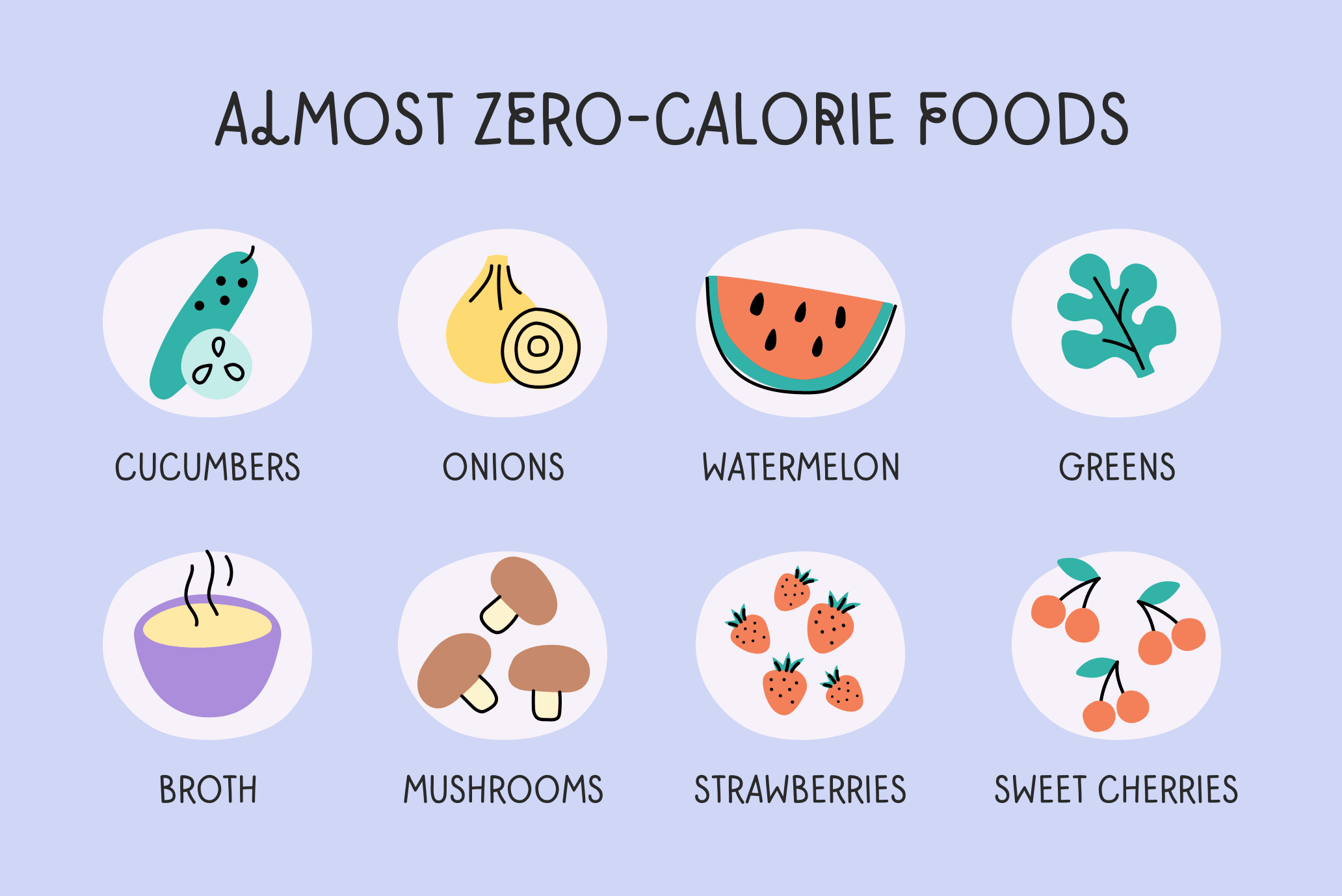Are zero-calorie foods a myth? Let's find out together in this article. Here, we will explain some popular nutrition misconceptions and help you avoid typical diet mistakes.
Any type of food contains calories, but their number can differ drastically. Most non-starchy vegetables contain a lot of water and indigestible fiber. That's why there can be 15-50 calories per 100g. On the contrary, oils are the most calorie-dense natural foods. 100g of pure olive oil has 900 calories.
Here is a list of foods that are very low in calories, according to USDA:

Artificial sweeteners such as aspartame, sucralose, saccharin, and acesulfame potassium can be considered zero-calorie foods because they contain almost no calories. Sweets and desserts that contain sugar substitutes can be significantly lower in calories and still have the same taste.
If you are fond of sweet snacks or cannot imagine your life without a dessert after a meal, you can buy artificial sweeteners. They mostly exist in the form of powder, peels, and syrup. Most brands use a combination of several artificial sweeteners in their formula to achieve a taste that is as close as possible to sugar.
Eating the same foods with a significantly lower calorie density can help you lose weight because they can trick your brain into thinking that you eat usual sweets. But remember that even sugar-free sweets are not zero-calorie foods, so don’t get too carried away with them.
Eat tasty food and lose weight with Unimeal app!
Take a Quiz – Get personal meal plan – Achieve your weight goals!
Start QuizSuch fizzy drinks as Cola Zero or Pepsi Zero contain zero calories and can replace sugary beverages. But they are still very far away from being healthy, so we don't recommend drinking them too often.
Artificial sweeteners can reduce your calorie intake, their contribution to health is controversial. Scientists claim that using sugar substitutes in high doses increases the risk of cancer and a number of chronic diseases and affects natural glucose regulation.
Including natural low-calorie foods will only benefit your diet. Fruits and vegetables can easily make you feel full even if you actually haven't eaten many calories. They might not be so satiating in the long-term perspective, but they can help you consume fewer calories during each meal. That is why you need to balance your meals with complex carbohydrates, protein, and fats.

Low-calorie diets are popular among actors, models, and athletes, these diets is not a healthy decision that might lead to undesirable consequences. Also, such nutrition can be safe only under professional supervision.
During the first days of such a diet, you will start losing weight primarily from your glycogen storage. Then you will proceed with losing your muscle tissue and fat. However, you won't likely get the desired result because of the physical and psychological effects of restrictive dieting.

If you decided to try fasting or intermittent fasting, it is better not to include any calories during fasting periods. However, some people prefer dirty fasting, which means that they consume up to 100 calories during fasting periods. Others choose alternate-day fasting, which allows you to eat up to 500 calories on fasting days.
If you started fasting due to medical reasons, consult your doctor on this matter. They might also provide you with a list of foods you can or cannot eat during fasting.
This is one of the most popular fitness and nutrition misconceptions. You probably heard that some foods require more calories to digest than they actually contain. It is not true. On average, you spend around 10% of the total calorie count on digestion. This number can increase up to 30% with high-protein foods.
The only type of “food" you can consider to be with negative calories is ice. Water doesn't contain any calories, but your body needs some energy to warm up ice to body temperature.

No, it is not possible to make-zero calorie foods at this point. You don't even need to eat little calories to lose weight. Consistent and safe weight loss implies a calorie deficit of 200-500 calories, which allows you to eat your favorite foods. Besides reducing calorie intake, you can also increase your activity to achieve a calorie deficit. There is no need to starve yourself or suffer to get rid of some extra pounds.
There are no zero-calorie foods and no need to aim for zero-calorie nutrition if you want to remain healthy while losing weight. You can replace regular fizzy drinks with zero-calorie options and eat sweets with sugar substitutes to decrease your overall calorie intake. Also, including low-calorie and fiber-rich foods will be beneficial to your diet and help you lose weight because they will make your stomach full.

Unimeal does not diagnose or suggest treatments. Any description of the diet, training plan or supplement should be discussed with your current physician or nutritionist. This article does not address specific conditions and is simply meant to provide general information on healthcare topics. Following any advice is at your own initiative and does not impose any responsibility on the blog authors for your health and safety.
Sources:
By choosing high-quality sources, we make sure that all articles on the Unimeal blog are reliable and trustworthy. Learn more about our editorial processes.
1.
2.
3.
4.
5.
6.
7.
8.
9.
10.
Related Articles